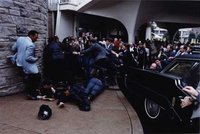John Hinckley, Jr.
|
|
John_Hinckley.gif
John Hinckley, Jr.
John Warnock Hinckley, Jr. (born May 29, 1955) attempted to assassinate U.S. President Ronald Reagan on March 30, 1981.
Biography
John Hinckley Jr. was born in Ardmore, Oklahoma, and grew up in Texas and Colorado. An off-and-on student at Texas Tech University from 1973 to 1980, in 1976 he headed to Los Angeles in hopes of becoming a songwriter. His efforts in this direction did not meet with success, and his letters home to his parents were full of tales of misfortune and pleas for money. He also spoke of a girlfriend, one Lynn Collins, who turned out to be a complete fabrication. He returned home to his parents' house in Evergreen, Colorado, before the year was out. Over the next few years he developed a pattern of living on his own for a while and then returning home, broke.
After repeated viewings of the 1976 movie Taxi Driver, in which a disturbed man (inspired by another aspiring assassin, Arthur Herman Bremer) played by Robert DeNiro plots to assassinate a presidential candidate to impress a child prostitute, Hinckley developed an obsession with child actress Jodie Foster, who played the prostitute in the film. When Foster entered Yale University, Hinckley moved to New Haven, Connecticut, for a short time to be nearer to her, slipping poems and messages under her door and repeatedly contacting her by telephone.
Failing to develop any meaningful contact with Foster, Hinckley developed such plots as hijacking an airplane and committing suicide in front of her in order to gain her attention. Eventually he settled on a scheme to win her over by assassinating the president, on the theory that as a historical figure, he would be her equal. To this end, he trailed then-president Jimmy Carter from state to state, but was arrested in Nashville, Tennessee on a firearms charge. Penniless, he returned home once again, and despite psychiatric treatment for depression, his mental health did not improve. In 1981, he began to target the newly elected president, Ronald Reagan. It was also at this time that he started collecting information on Lee Harvey Oswald, President Kennedy's assassin, whom he saw as a role model.
Just prior to Hinckley's failed attempt on Reagan's life, he wrote to Foster:
Over the past seven months I've left you dozens of poems, letters and love messages in the faint hope that you could develop an interest in me. Although we talked on the phone a couple of times I never had the nerve to simply approach you and introduce myself. [...] the reason I'm going ahead with this attempt now is because I cannot wait any longer to impress you.
On March 30, 1981 Hinckley fired a revolver six times at Reagan as he left the Hilton Hotel in Washington, DC after addressing an AFL-CIO conference. Hinckley's shots hit the president in the chest, and wounded Press Secretary James Brady, police officer Thomas Delahanty, and Secret Service agent Timothy McCarthy. Hinckley did not attempt to flee and was arrested at the scene. Reagan survived his wound after surgery at George Washington University Hospital. Brady, who had a bullet lodge in his brain, was permanently disabled; McCarthy and Delahanty were less seriously injured and recovered.
The gun used by Hinckley was a Rohm RG-14 revolver in .22LR caliber, with a 1 7/8 inch barrel. The serial number was L731332.
At the trial in 1982, charged with thirteen offenses, Hinckley was found not guilty by reason of insanity on June 21. The defense psychiatric reports had found him to be insane while the prosecution reports declared him legally sane.
Hinckley was confined at St. Elizabeth's Hospital in Washington, D.C. He was allowed to leave the hospital for supervised visits to his parents in 1999 and longer, unsupervised releases in 2000. These priveliges were revoked when he was found to have smuggled materials about Foster back into the hospital.
Hinckley is one of the assassins portrayed in Stephen Sondheim and John Weidman's musical Assassins, in which he sings a folk ballad, "Unworthy of Your Love", professing his love to Foster. The song is a duet with Lynette "Squeaky" Fromme who was cult leader Charles Manson's most loyal disciple.
Reaction to verdict
The not guilty by insanity verdict led to widespread dismay and as a result, the U.S. Congress, and a number of states, re-wrote the law regarding the insanity defense. Three states have abolished the defense altogether. In the United States prior to the Hinckley case, the insanity defense was used in less than 2% of capital cases and was unsuccessful in almost 80% of the trials.
Connections between the Hinckley and Bush families
Hinckley's father, John Warnock Hinckley Sr., was a top (at the legal limit) contributor to the campaigns of the vice president, George H. W. Bush. A few hours before the assassination attempt, Hinckley Jr's brother Scott had been warned by the Department of Energy of an impending fine against his family's oil company, Vanderbilt Energy, for pricing irregularities. The dinner engagement scheduled between Scott and Neil Bush for next day, was cancelled. [1] (http://www.tarpley.net/bush17.htm) This connection between the families and coincidences, like the Secret Service getting lost on the way to the hospital, have been the source of some conspiracy theories about the shooting. However, it is not unusual for executives in a particular industry (such as the Hinckleys and Bushes in the oil industry) to have personal and business connections.

